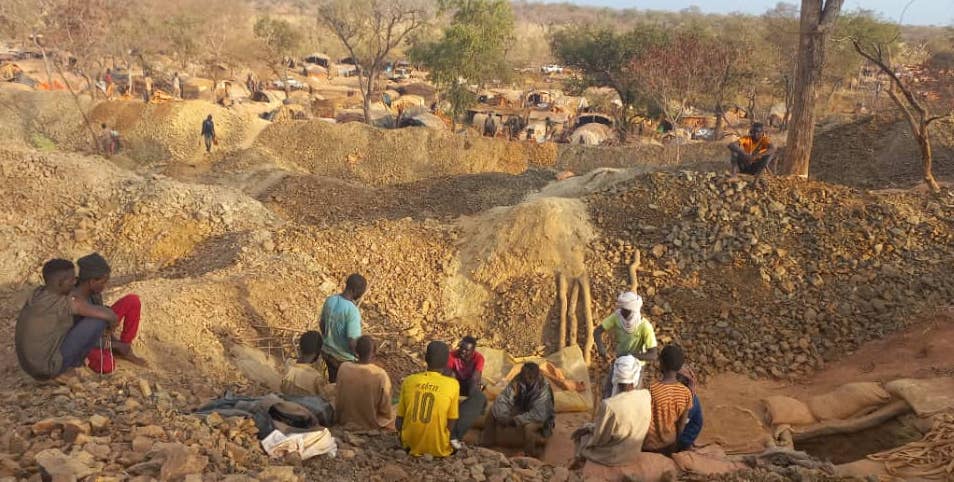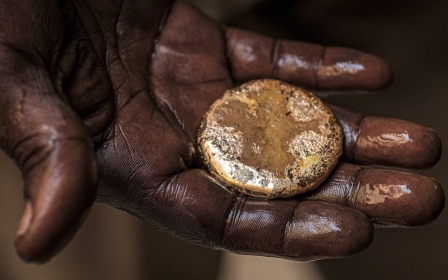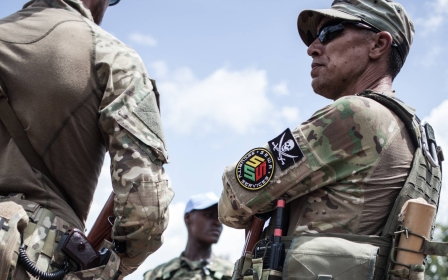Syrian fighters participated in Wagner Group massacres in Central African Republic

Eyewitnesses fleeing attacks by Wagner Group mercenaries in the Central African Republic (CAR) have told Middle East Eye about the role played by Syrian and Arab fighters, as the Russian network continues to expand its influence across Africa.
Two witnesses to a series of attacks that began at the site of a gold mine in the CAR region of Andaha in late March told MEE that Syrian mercenaries had been among the Wagner fighters.
'They spoke Arabic in a Levantine dialect, which I know very well, so I realised they were Syrian mercenaries'
- Witness to Wagner Group attack
The Sudanese witnesses, who could not give their names for security reasons, had been working in Andaha as artisanal gold miners.
They were speaking in the village of Blubol, South Darfur, which they reached after walking for over a week, often without food and water, passing through Chad and then across the border into Sudan. A number of those fleeing the attacks died trying to reach safety.
The attacks in Andaha, a mining region, began on 23 March and continued sporadically, leaving more than 100 gold miners from Sudan, Chad, Niger and CAR dead.
Stay informed with MEE's newsletters
Sign up to get the latest alerts, insights and analysis, starting with Turkey Unpacked
After surviving the attacks, the Sudanese miners were detained for a number of days by Wagner mercenaries. They told MEE they were tortured by the fighters, some of whom had Syrian features and spoke in a Syrian dialect.
“There are multinational fighters with the Russian security company. We saw fighters from Russia, Syria and other African countries, including Central African Republic and others," one of the detainees said.
"When the Wagner fighters abducted me, I saw some Syrian fighters. One of them even conducted the investigation with us and did the translation for the Russian officers. They spoke Arabic in a Levantine dialect, which I know very well, so I realised they were Syrian mercenaries."
The witnesses said the Wagner forces, who are allied to the CAR government in its fight against rebels, including the Seleka group, had attacked civilians, and there had been no recent clashes between government and rebel forces in Andaha.
Wagner controls diamond and gold mines across CAR and in neighbouring Sudan.
Arab fighters in Central African Republic
The Wagner Group is seen by western officials as a way for Russian President Vladimir Putin's government to spread its influence around the world, securing valuable gold mining concessions that help Moscow circumvent sanctions and building relationships with amenable African and Middle Eastern governments.
Russia's invasion of Ukraine has increased Moscow's need for revenue, and it is believed the war has spurred efforts to secure gold from Africa, which is then allegedly laundered through the United Arab Emirates.
Yevgeny Prigozhin, a Russian oligarch known as "Putin's chef" because his restaurants have hosted dinners for the Russian president and accompanying foreign dignitaries, is purported to be the head of the Wagner Group. Prigozhin denies the claims.
'There is ample evidence that Wagner has deployed Syrian, Chechen and Libyan fighters in CAR'
- Pauline Bax, Crisis Group
Having intervened on the side of Syrian President Bashar al-Assad’s government in Syria’s civil war in 2015, and later in the civil war in Libya, Russia and the Wagner Group have established a significant presence in the Middle East and North Africa. Now, fighters from both Syria and Libya are working for the Russian group outside their home countries.
Pauline Bax, deputy director of International Crisis Group's Africa programme, told MEE there was "ample evidence that Wagner has deployed Syrian, Chechen and Libyan fighters in CAR".
Bax said that Wagner forces recruited young men, often former rebels, from the provinces of CAR to act as local militias. These fighters, nicknamed "Black Russians," protect smaller towns from attack and "have been given a free hand to collect local levies, likely so that Wagner does not have to pay them".
One of the victims of the Wagner attacks told MEE the group controlled the gold mining areas across Andaha, including in N'dele, Seinkilo, Gordil and Tirigoulou. The mercenary network is said to be most concerned with N’dele, which is the main diamond area located between Andaha and the capital, Bangui.
"The recent military movements of the Wagner fighters since March were very clear. They want to tighten their control on the strategic city of N'dele in order to dominate the diamond field mining area," the Sudanese eyewitness told MEE.
"These developments fit into the overall pattern of Wagner's activities in CAR," said Bax. "In Bangui, Wagner troops protect the government, particularly the presidency, while their modus operandi in the provinces indicates that they are primarily interested in securing gold and diamond zones.
"They control several important mining areas, and regularly engage in fighting in mining areas that are under control of CPC rebels," she said, referring to the coalition of rebels fighting the government.
A network of gold and diamond mines
The Bangui government has given a Russian company the rights to the country's only industrial gold mine.
"Wagner provides security at this mine; there are no longer any CAR officials on the ground," said Bax. "Wagner troops elsewhere are trying to take control of mining zones, but they do not always expel the artisanal miners unless they are being suspected of working with CPC rebels," she said.
The eyewitnesses, who had stayed for around a year in CAR working in the mining sector, told MEE that the presence of the CAR rebels' coalition, including the Seleka, was not often felt in Andaha.
But they said that Wagner's March attack, and the ones which followed it, had nothing to do with the war between the government and the rebels, but were in fact about control over the gold and diamond mining fields.
"I did not see any clear presence of rebels in Andaha recently," said Adam Zakaria Abakar, a miner who fled from CAR. "They attacked the miners, who are actually civilians. Wagner wants to dominate these gold and diamond mining fields and expel any small miner working there."
Bax said: "Sadly, artisanal miners are collateral damage of the tit-for-tat battles between Wagner and the rebels. The government does not have money to pay Wagner for its services; Wagner thus needs to pay itself through mining revenue...
"Russia tries to expand its sphere of influence in Africa by positioning itself as a security provider. One of its main selling points, apart from its formidable arms industry, is that it is not the West. Wagner has been a convenient vehicle because it is not a legal entity and does not have to play by any rules."
This article is available in French on Middle East Eye French edition.
Middle East Eye delivers independent and unrivalled coverage and analysis of the Middle East, North Africa and beyond. To learn more about republishing this content and the associated fees, please fill out this form. More about MEE can be found here.






